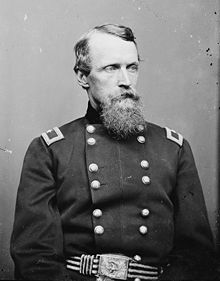David B. Birney
David Bell Birney (born May 29, 1825 in Huntsville , Alabama , † October 18, 1864 in Philadelphia , Pennsylvania ) was an American businessman, lawyer and a Union general during the American Civil War .
Before the civil war
David Bell Birney was the son of James G. Birney , an abolitionist from Kentucky . Birney's family returned to Kentucky in 1833, where James Birney released his slaves . In 1835 the family moved to Cincinnati ( Ohio ), where his father published an anti-slavery newspaper. After numerous threats from pro-slavery mobs, the family moved to Michigan and eventually Philadelphia.
David graduated from Phillips Academy in Andover ( Massachusetts ), ran a business, studied law and was admitted as a lawyer. He returned to Philadelphia, where he practiced as a lawyer from 1856 until the outbreak of the American Civil War.
In the civil war
Birney joined the Union Army as a Second Lieutenant in the 23rd Pennsylvania Infantry Regiment , a unit he had raised himself at his own expense, which happened shortly after Fort Sumter . Shortly before the war, he had studied military texts in preparation for such a position. On August 31, 1861 he was promoted to Colonel and on February 17, 1862 to Brigadier General , which was obviously favored by political influences and not on the basis of military merits. He commanded a brigade in the division of Brigadier General Philip Kearny from the III Corps , which he in the whole campaign Peninsula led. At the Battle of Seven Pines , he was charged with disobeying an order from his corps commander , Maj. Gen. Samuel P. Heintzelman , in allegedly for "stopping his command a mile from the enemy". However, the orders had simply been misunderstood. Birney came before a military tribunal , but on the basis of a clearly convincing testimony from Kearny, he was acquitted and was given back his command.
Birney fought in the Second Battle of the Bull Run , where he supported Maj. General John Pope's Army of Virginia . When Kearny was killed in battle, Birney took command of his division. By stationing in Washington, DC , he missed the Battle of Antietam , but his division returned to the Army of the Potomac to fight at Fredericksburg . Birney encountered military discipline problems again there, this time allegedly because he refused to support an attack by Major General George G. Meade's divisions on the left flank of the Union line. However, he was congratulated by the III Corps Commandant Major General George Stoneman in his official report for "the handsome manner in which he treated his division" so that he avoided punishment a second time. Birney led his division in heavy fighting at Chancellorsville , where he suffered more casualties (1,607 men) than any other division in the army. As a result of his exceptional service at Chancellorsville, he was named major general on May 20, 1863.
At the Battle of Gettysburg , the well-known Major General Daniel Sickles was in command of the III Corps. On July 2, 1863, Sickles defiantly withdrew his corps from his assigned defensive position at Cemetery Ridge . Birney's new position was on one side of Devil's Den to Wheatfield and on the other side of Devil's Den to Peach Orchard , which was clearly right in the path of the Confederate attack, but the front line was far too long for a single division to defend. Assaulted by the division of Maj. Gen. John Bell Hood and Lafayette McLaws , Birney's division was destroyed. Army commander Meade rushed with reinforcements, but the line could not be held. His division and the whole corps were finished as one fighting force. When Birney saw the few survivors of his division gathered around him in Cemetery Ridge, he whispered to one of his officers, "I wish I were dead by now." Sickles was seriously wounded by a cannonball, so Birney took temporary command of the Corps, even though he had two small wounds himself. He remained in command until February 1864.
Birney began the Overland campaign as division commander of the II Corps , his III Corps ceased to exist after the reorganization in the spring. After performing well in Wilderness , Spotsylvania Court House , where he was wounded by a shell fragment, and Cold Harbor , Lieutenant General Ulysses S. Grant gave Birney command of the X Corps in the Army of the James on July 23, 1864 . However, Birney became ill during the Siege of Petersburg on Malaria (sometimes referred to as dysentery and typhoid considered), he that home to Philadelphia was ordered, where he died three months later. Birney was buried in Woodlands Cemetery .
literature
- Bates, Samuel P., Martial Deeds of Pennsylvania , TH Davis & Co., 1876
- Eicher, John H., and Eicher, David J., Civil War High Commands , Stanford University Press, 2001, ISBN 0-8047-3641-3 .
- Tagg, Larry, The Generals of Gettysburg , Savas Publishing, 1998, ISBN 1-882810-30-9 .
Web links
- David B. Birney in the database of Find a Grave (English)
Individual evidence
| personal data | |
|---|---|
| SURNAME | Birney, David B. |
| ALTERNATIVE NAMES | Birney, David Bell |
| BRIEF DESCRIPTION | American businessman, lawyer, and Union general |
| DATE OF BIRTH | May 29, 1825 |
| PLACE OF BIRTH | Huntsville , Alabama |
| DATE OF DEATH | October 18, 1864 |
| Place of death | Philadelphia , Pennsylvania |
